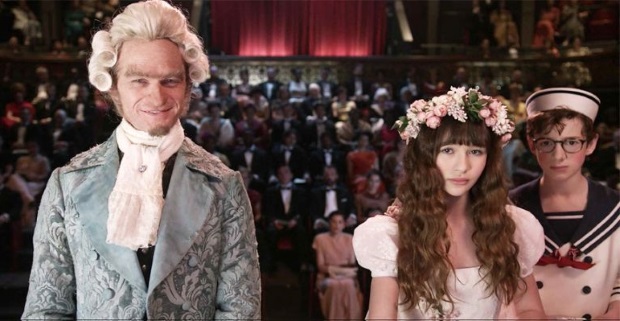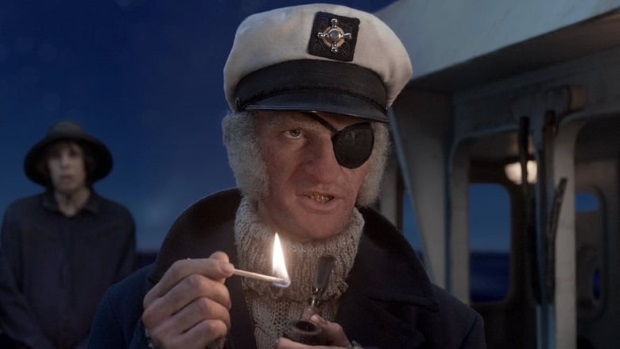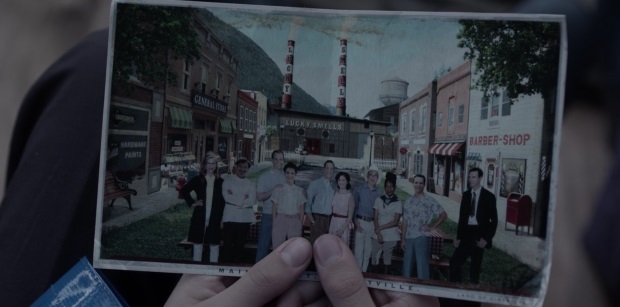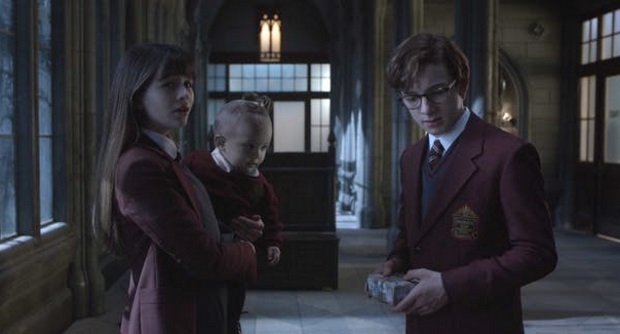A Series Of Unfortunate Events season 1 recap
Need a refresher on what happened in A Series Of Unfortunate Events season 1? Step this way...
This article comes from Den of Geek UK.
Contains major season one spoilers (obviously!)
Last January, just over ten years since the book series concluded and a fitting thirteen since the last attempt at an adaptation, Netflix released the first season of A Series Of Unfortunate Events. Starring Neil Patrick Harris as the villainous Count Olaf and with the direct involvement of series creator Daniel Handler, the TV adaptation of the beloved thirteen volume saga promised a more faithful interpretation of the source material than the heavily compromised 2004 film, which jammed the first three books together and rushed to solve the central mysteries in under two hours.
From the start, the television series felt truer to the spirit of the books, if not always to the letter of their narrative. It was a lavish and clearly expensive endeavour, devoting two episodes to every book and sparing no expense in adapting the varied settings. Furthermore, it was both popular and successful, swiftly renewed for two more seasons.
With the next instalment in this sorry tale of woe just around the corner, we’re taking a quick dive back into the events of season one, to remind you of all the terror, treachery and ongoing secrets of the Baudelaires’ plight.
A Series Of Unfortunate Events, in book, television and film form, begins on the shores of Briny Beach, as we meet Violet, Sunny and Klaus Baudelaire for the first time. The three children of a wealthy couple, the Baudelaires each have very specific and somewhat improbable (but useful) talents. Fourteen year old Violet is a keen inventor, twelve year old Klaus is an avid reader with a photographic memory, and infant Sunny can chew through just about anything with her formidable teeth. All three are intelligent, curious and kind, but their lives are turned upside down when their family’s incompetent banker, the perpetually coughing Mr Poe, interrupts their day at the beach with the news that their parents have been killed in a terrible fire.
No sooner has the Baudelaires’ world been destroyed than they are sent to live with distant relative Count Olaf, a cruel, violent alcoholic and terrible actor who forces them to do an endless series of menial chores around his decrepit house while drinking and rehearsing with his dimwitted acting troupe/minions.

The Baudelaires take solace in the library of kindly neighbouring judge Justice Strauss, but the situation proves unbearable when, in disgust at the Baudelaires not cooking roast beef for his acting troupe (despite never asking for it), Olaf hits Klaus across the face. The Baudelaires attempt to convince Mr Poe to remove them from Olaf’s care but, in the first of many instances of uselessness, the banker insists there is nothing he can do.
The orphans become suspicious when, in an apparent attempt to smooth things over, Olaf invites them to take part in his new play, The Marvellous Marriage, giving Violet a major role as the bride opposite Olaf’s romantic lead. Unnerved, Klaus does some research and, upon learning that Justice Strauss will be playing the judge, realises that the play is a cover for a real wedding, that will result in Olaf gaining access to the Baudelaires’ fortune, after which he will dispose of them. When Klaus confronts Olaf, the villain reveals that he has taken Sunny hostage and will kill her if either Violet or Klaus attempt to intervene.

The night of the play arrives and when all hope seems lost, the right handed Violet manages to invalidate the wedding by signing the certificate in her left hand – by law, not ‘her own hand’. Sunny is set free before this is revealed, and Olaf quickly escapes, but not before telling Violet that he will stop at nothing to get their fortune.
The Baudelaires are subsequently sent to live with their Uncle Monty. A herpetologist, Monty is kindly and eccentric, and things seem to be going well, until Olaf turns up in disguise as Monty’s new assistant Stefano, having murdered his predecessor. The Baudelaires attempt to convince Monty of the truth but before they can Olaf murders Monty, making it look like one of the snakes was responsible. He then attempts to spirit the Baudelaires away to Peru, but is thwarted when Sunny helps demonstrate to Mr Poe that the snake in question is in fact harmless and Violet finds the murder weapon. Olaf, in what quickly becomes a pattern, escapes again.
During all of this, the Baudelaires slowly become aware of a conspiracy that may or may not have something to do with their parents who, as hinted by a series of glimpses of a mysterious couple trying to get back to their children, may or may not be alive. The conspiracy involves a secret organisation known only as VFD, that seems to include Olaf, Monty, the series’ narrator Lemony Snicket and Mr Poe’s swashbuckling, somewhat overqualified secretary Jacqueline, who turns up at location after location trying to help the Baudelaires.
The next guardian is their Aunt Josephine, who lives in a ramshackle house perched on a cliff over a lake populated by vicious leeches. The Baudelaires think they may be close to finding answers, but Josephine, previously described by Jacqueline as ‘formidable’, proves to be a shadow of her former self, consumed by fears in the wake of her husband’s being devoured by the leeches. Lonely and unable to leave due to a crippling fear of realtors, Josephine is easily swindled when Olaf turns up again, this time in disguise as salty sailor Captain Sham.

When Josephine vanishes in an apparent suicide, Olaf again attempts to adopt the Baudelaires, but the orphans manage to find a secret message hidden in their guardian’s suicide note and, in the middle of a hurricane, cross the lake to find Josephine sheltering in a cave and refusing to leave, having chosen to vanish when threatened by Olaf. Playing on her fear of realtors (the cave is for sale), the orphans convince Josephine to come back with them, only to be intercepted by Olaf, who throws Josephine to the leeches. The Baudelaires once again manage to expose Olaf to Mr Poe, but, rather than being sent to the next guardian on the list, decide to stow away to find a mysterious lumbermill seen in a picture that features their parents, Monty, Josephine and, unbeknownst to the Baudelaires, narrator Lemony Snicket.
This is a wise deviation from the books, in which the lumbermill was just another home found by Mr Poe. The change gives the Baudelaires more agency, helps bring in the conspiracy subplot more, and somewhat alleviates the otherwise repetitive cycle of the orphans being sent to guardian after guardian only for a disguised Olaf to turn up again.

However, the lumbermill turns out to have little in the way of answers and a disguised Olaf does turn up again, working in disguise as Shirley, the secretary of sinister local optometrist Dr Orwell, who hypnotises Klaus in an attempt to make him endanger the other workers in the lumbermill and convince mill owner Sir to hand the Baudelaires over to Olaf.
Meanwhile, the mysterious couple arrive at what appears to be the lumbermill and, in just the moment when it seems the Baudelaires will be rescued by their parents, it is revealed that they are in fact the parents of another set of children, the Quagmire triplets, and the Baudelaires remain on their own. However the Quagmires prove no luckier than the Baudelaires; within hours of their parents’ return, their house is burnt down by a mysterious (and fashionable) assailant instantly familiar to any fan of the books.
Meanwhile, the Baudelaires again manage to expose Count Olaf, just as Mr Poe catches up with them and announces they will be sent to boarding school. The season ends as the cast sings a melancholic song and the Baudelaires and Quagmires wait at their grim new school, unaware that nearby is a photo of a young Lemony and Olaf, side by side as friends at the school, hinting at deeper mysteries to come.

The first season was well made and highly entertaining, but not without flaws. The slim books occasionally felt stretched over two hour run times and some of the attempts at bringing in the conspiracies earlier (the books don’t introduce them until the fifth volume) felt contrived and tacked on. Largely, however, the elements of added serialisation did work and built intrigue and interest as to where the series would go next. The performances were uniformly excellent, with Neil Patrick Harris managing to make Olaf simultaneously hilarious and threatening; far more so than Jim Carrey’s interpretation of the character. Malina Weissman and Louis Hynes made the Baudelaires, who can sometimes come off as goody two-shoes in the books, endearing and likeable. Meanwhile the guest stars, from Aasif Mandvi to Alfre Woodard, kept the individual episodes engaging despite a somewhat repetitive structure.
Overall, A Series Of Unfortunate Events largely captures the spirit of the books, blending absurdity, adventure and melancholy to captivating, entertaining affect. The world of the series is lovingly and meticulously realised and for Snicket fans the adaptation is a dream come true, while those unfamiliar with the source material will find plenty to enjoy in the quirky humour and slowly unfolding mystery. Season 2 lands on March 30, Season Three has already finished filming (let’s hope it’s not another year long wait), and all evidence seems to suggest that we’re in for more televisual resplendence, a word which here means a Very Fine Diversion.